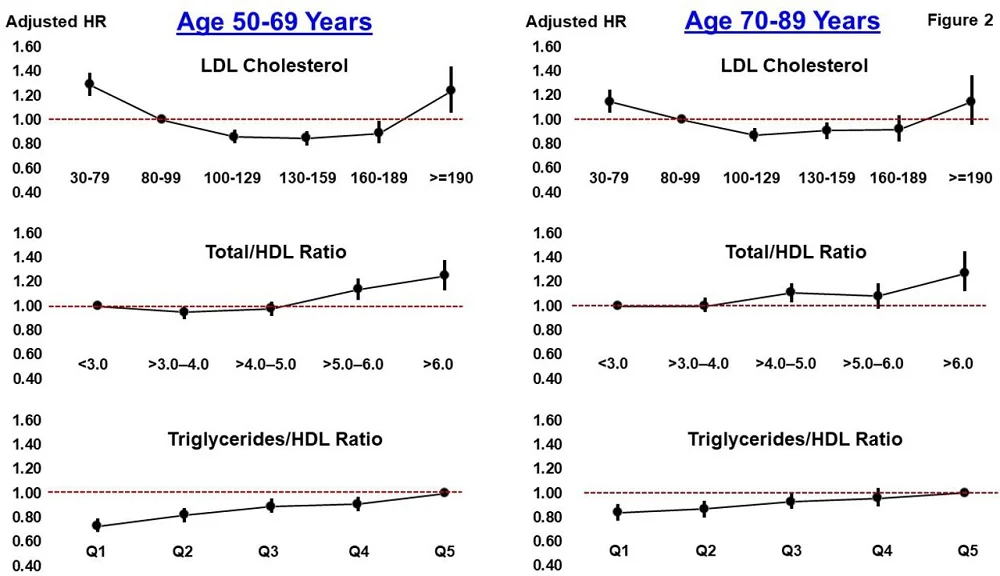A new observational study suggests that lower LDL cholesterol levels are not necessarily better. Instead, the ratio of triglycerides to HDL may be more important [1].
Putting common wisdom to the test
LDL cholesterol is largely considered harmful, but lower levels might not be beneficial according to a new study by researchers from the University of Pittsburgh and the University of South Florida.
The researchers based their analysis on electronic medical records that were derived from the University of Pittsburgh Medical Center’s healthcare system and dated 2000 to 2022. This allowed them to assemble a vast cohort of 178,000 patients aged 50 to 89.
The participants had to meet several criteria, including a lack of diabetes or statin therapy at baseline and during the first year of follow-up. Patients who died during the first year of follow-up or had outlier levels of total or LDL cholesterol were also excluded to mitigate reverse causation. The researchers divided the sample into six LDL-C categories: 30-79, 80-99, 100-129, 130-159, 160-189, and over 190 mg/dL.
The golden mean
Over a 6-year average follow-up time, intriguing results emerged. A U-shaped relationship was observed between LDL-C levels and 10-year overall mortality. The highest all-cause mortality (19.8%) was found in the 30-79 group. In the other groups, it was 14.7%, 11.7%, 10.7%, 10.1%, and 14.0%, respectively.
Compared to the referent group of 80-99 mg/dL, this translated into a 23% increase in mortality risk for the lowest LDL-C group. In the following three groups, within the 100-189 mg/dL range, the mortality risk was lower than in the referent group by 13%, 12%, and 9%, respectively. In the highest LDL-C group of over 190 mg/dL, the mortality risk was again higher than in the referent group – by 19%.
The results were broadly similar for atherosclerotic cardiovascular disease (ASCVD) risk. However, in this case, the highest risk was recorded for the group with the highest LDL-C levels (over 190 mg/dL). Another interesting finding was that in men, even in this subgroup, mortality risk was not significantly higher than in the referent subgroup.
The parameter that could
However, the researchers did find a parameter with a linear relationship with mortality risk: the ratio of triglycerides and HDL cholesterol (HDL-C), which is often considered beneficial. Total cholesterol to HDL cholesterol ratio (T-C/HDL-C) also seemed to be a better predictor of mortality than LDL-C.
“Compared with patients in the highest quintile of triglycerides/HDL-C ratio (value of ≥3.44), those in the lowest quintile (value of ≤1.06) had an estimated 24% lower risk of mortality,” the paper says. “Thus, in aggregate and irrespective of age, the secondary lipid measures of T-C/HDL-C ratio and triglycerides/HDL-C ratio appeared to be more predictive of mortality than LDL-C, and a triglycerides/HDL-C ratio of about 1 or lower appears to be optimal.”

The researchers note that the insurance industry seems to have already discovered this relationship [2]: both T-C and HDL-C are more widely used in life insurance policy underwriting than LDL-C. This is not the first time that insurance companies, financially incentivized to discover factors related to health and mortality risks, have provided clues for scientists.
As with any observational study, this one cannot definitely prove causality. However, it aligns with some, though not all, of the previous research on this subject [3]. The authors call for more studies, including those on statin use, that would take into account both statins’ effectiveness in preventing cardiovascular disease and their side effects, such as muscle pain and increased risk of type 2 diabetes [4].
In this analysis among primary prevention-type patients without diabetes aged 50–89 years not on statin therapy at baseline or within 1 year, we found no evidence of a gradient relationship between LDL-C and long-term mortality risk. Instead, we observed that within the entire LDL-C range of 100–189 mg/dL (about two-thirds of the total patient population), mortality risk was similar and slightly lower than the referent LDL-C category of 80–99 mg/dL. These data conflict with the prevailing belief that ‘lower LDL-C is better’ yet align with results from multiple studies.
Literature
[1] Kip, K. E., Diamond, D., Mulukutla, S., & Marroquin, O. C. (2024). Is LDL cholesterol associated with long-term mortality among primary prevention adults? A retrospective cohort study from a large healthcare system. BMJ open, 14(3), e077949.
[2] Fulks, M., Stout, R. L., & Dolan, V. F. (2009). Association of cholesterol, LDL, HDL, cholesterol/HDL and triglyceride with all-cause mortality in life insurance applicants. J Insur Med, 41(4), 244-253.
[3] Johannesen, C. D. L., Langsted, A., Mortensen, M. B., & Nordestgaard, B. G. (2020). Association between low density lipoprotein and all cause and cause specific mortality in Denmark: prospective cohort study. Bmj, 371.
[4] Mansi, I. A., Chansard, M., Lingvay, I., Zhang, S., Halm, E. A., & Alvarez, C. A. (2021). Association of statin therapy initiation with diabetes progression: a retrospective matched-cohort study. JAMA internal medicine, 181(12), 1562-1574.




